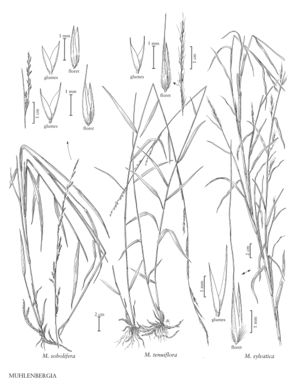Difference between revisions of "Muhlenbergia sobolifera"
FNA>Volume Importer |
FNA>Volume Importer |
||
| Line 41: | Line 41: | ||
|publication year= | |publication year= | ||
|special status= | |special status= | ||
| − | |source xml=https://jpend@bitbucket.org/aafc-mbb/fna-data-curation.git/src/ | + | |source xml=https://jpend@bitbucket.org/aafc-mbb/fna-data-curation.git/src/f6b125a955440c0872999024f038d74684f65921/coarse_grained_fna_xml/V25/V25_720.xml |
|subfamily=Poaceae subfam. Chloridoideae | |subfamily=Poaceae subfam. Chloridoideae | ||
|tribe=Poaceae tribe Cynodonteae | |tribe=Poaceae tribe Cynodonteae | ||
Revision as of 20:24, 24 September 2019
Plants perennial; rhizomatous, usually not cespitose. Culms 25-95 cm tall, 0.8-1.5 mm thick, erect or ascending; internodes smooth, shiny, and glabrous for most of their length, scabridulous immediately below the nodes. Sheaths glabrous, margins hyaline; ligules 0.3-1 mm, membranous, truncate, ciliolate; blades 4-16 cm long, 2-7 mm wide, flat, glabrous, usually smooth, occasionally scabridulous. Panicles 4-18 cm long, 0.2-0.8 cm wide, narrow, usually exserted; axillary panicles usually exserted, sometimes partially included in the subtending sheath; primary branches 0.6-4 cm, ascending to appressed; pedicels 0.3-1.6 mm, strigose. Spikelets 1.6-3 mm, erect, overlapping the next spikelet on the branch by 1/2 its length. Glumes equal to subequal, 1-2.5 mm, much shorter than the florets, scabridulous (particularly over the veins), 1-veined, narrowing from above the broad, overlapping bases to the acute apices, unawned or awned, awns to 1 mm; lemmas 1.6-2.8 mm, lanceolate, hairy on the calluses, lower 1/2 of the midveins, and margins, hairs 0.3-0.5 mm, apices acuminate, unawned or awned, awns to 1 mm; paleas 1.6-2.9 mm, lanceolate, basal 1/2 with hairs shorter than 1. 5 mm, apices scabridulous, acuminate; anthers 0.4-1 mm, yellow. Caryopses 1-1.5 mm, fusiform, brown. 2n = 40.
Distribution
Conn., N.J., N.Y., Del., D.C, Wis., W.Va., Ont., N.H., Tex., N.C., Tenn., Pa., Mass., R.I., Vt., Va., Md., Ala., Ark., Ill., Ga., Ind., Iowa, Maine, Kans., Nebr., Okla., Ohio, Mo., Minn., Miss., Ky.
Discussion
Muhlenbergia sobolifera grows in dry upland forests, oak woodlands, and on rock outcrops of sandstone, chert, or limestone formations, at elevations of 0-1200 m. It is restricted to the Flora region.
Selected References
None.
